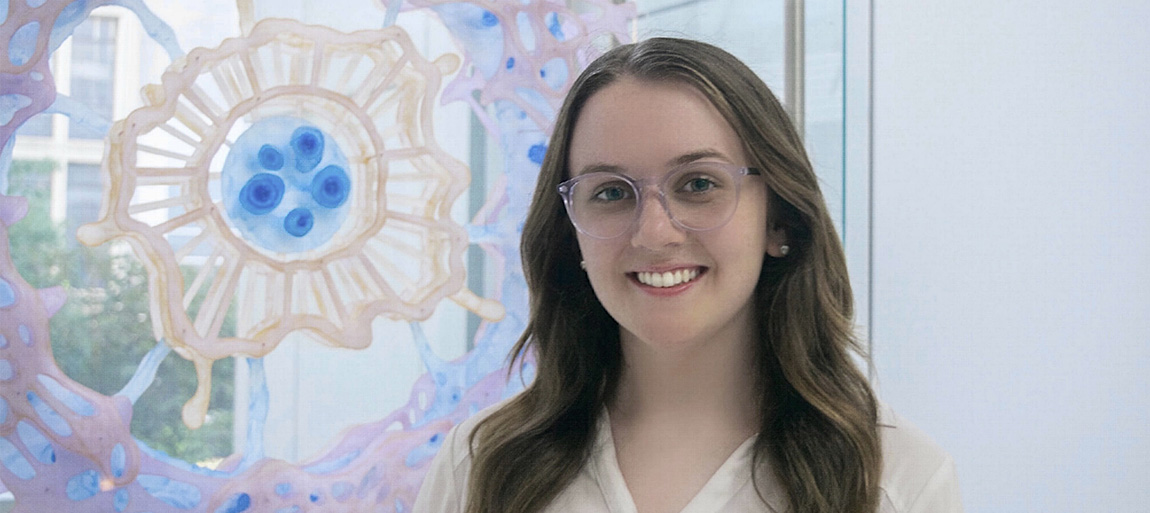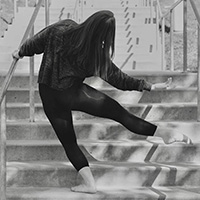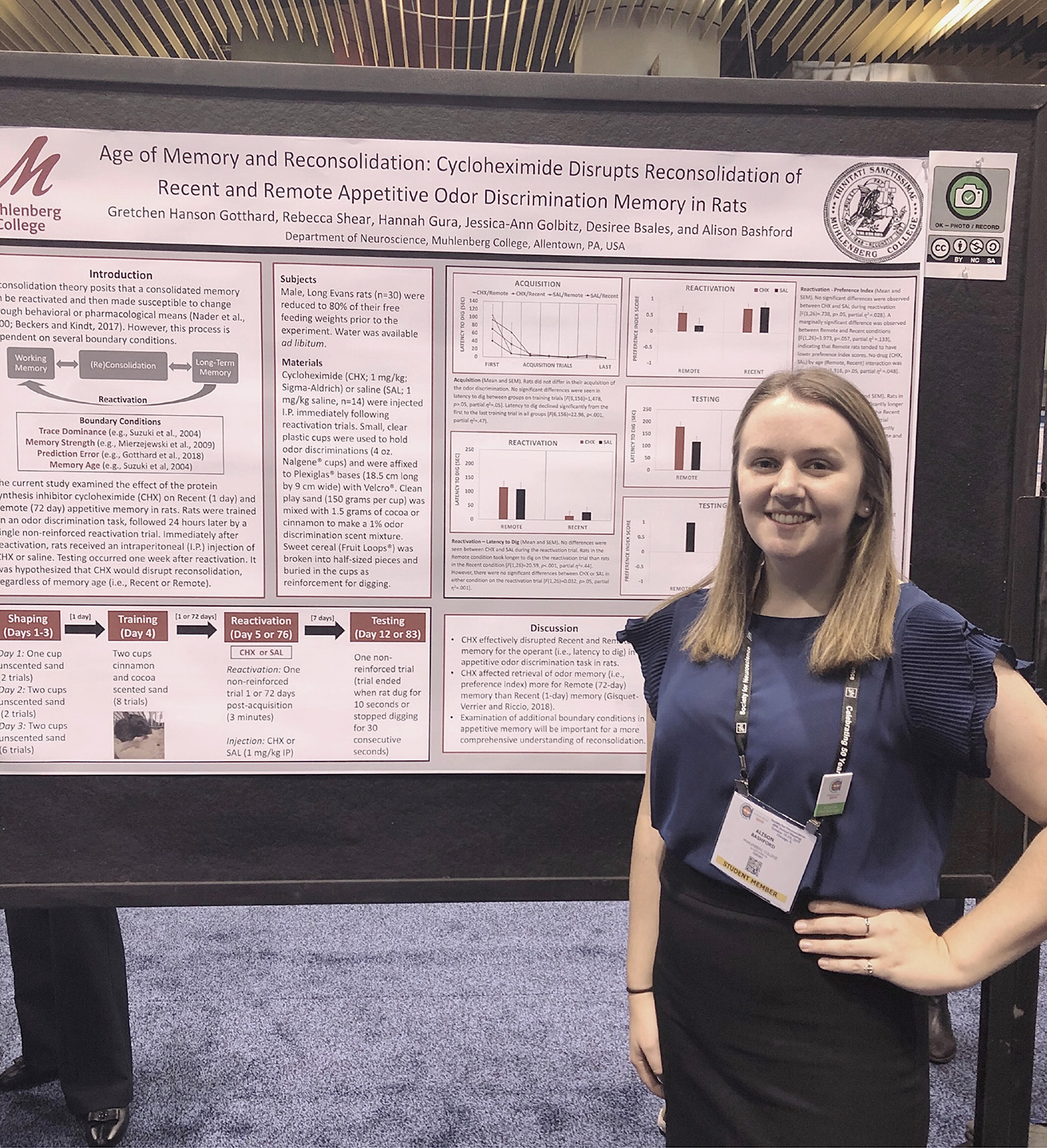In Pursuit of the Mind-Body Connection
As Alison Bashford ’20 embarks on a Ph.D. in neuroscience, she holds on to roots in danceBy: Scott Snyder Monday, August 8, 2022 04:36 PM

Alison Bashford ’20 didn’t even know Muhlenberg had a neuroscience program when she arrived on campus in the fall of 2016. She did know that the College had strong programs in both dance and the sciences, and that studying here would allow her to pursue her passion for both.
Now this fall, she’s embarking on Ph.D. studies in neuroscience at Drexel University in Philadelphia—and she’s still dancing.
Bashford’s studies at Drexel will be supported by a prestigious Graduate Research Fellowship from the National Science Foundation—only about 2,000 of the 12,000 students who apply annually receive funding. Her program starts with two years of coursework in advanced neuroscience and statistics and rotations through various research labs before she settles on a three- to four-year thesis project.

Bashford says her research interests currently lie in the brain chemistry of addiction. Her first research rotation at Drexel will study the role of the brain chemical dopamine in cocaine dependency in rats. But where her research journey might ultimately take her is still up in the air.
“It’s pretty open-ended at this point,” she says. “You start with a question and you think it’s going somewhere, and then it goes in all different directions based on what you find. And that informs your next question.”
Bashford’s journey began at Muhlenberg, where she started out planning to major in biology and minor in dance.
“I didn’t always have to run from science lab to science lab. I got to take ballet between bio and chemistry.”
“Then I started thinking about how these two things are related,” she says. “Why am I studying both of these things at the same time? And I got really interested in thinking about the mind-body connection and how I could use both of these interests to build a career.”
Her dance minor became a major, with a concentration in dance science and coursework in anatomy and kinesiology (the study of movement in the human body). At the time, she thought she might like to pursue a career as a physical therapist for a ballet company. She got an internship in physical therapy, but she wasn’t entirely sold. Yet her interest in the brain-body connection persisted, and a few weeks before her sophomore year, she changed her schedule to add her first neuroscience course, Brain and Behavior. That did the trick.
“I was really excited about psychology and really interested in human behavior and mental illness, particularly memory disorders,” she says. “I really wanted to be part of the work that drove mental illness treatment further.”
Bashford reached out about research opportunities to Gretchen Gotthard, a neuroscience and psychology professor whose research is in memory disorders, and she joined Gotthard’s lab in the spring semester of her sophomore year. It quickly became clear to Bashford that her professional interests were leading her toward science and away from dance, but she was grateful to be able to pursue both.
“I just really enjoyed being a dance major,” she says. “I loved being part of the dance community, I loved the classes I was taking. I didn’t always have to run from science lab to science lab. I got to take ballet between bio and chemistry.”
Along with Gotthard, Bashford credits neuroscience professor Jeremy Teissere with supporting her interdisciplinary pursuits. Faculty in the dance program were similarly supportive, and she often had conversations with dance faculty about her neuroscience courses and how they applied to her work in dance.

“I think what I appreciate most about Muhlenberg is their support of being interdisciplinary,” Bashford says. “A lot of arts departments and science departments are very strict about focusing on one area. I never felt pressured to spend all my time doing one or the other. I always felt extremely empowered by both departments.”
Bashford was among a handful of students working with Gotthard on memory research with rats—teaching the rats a task, and then using the drug cycloheximide to disrupt the rats’ memory of the task.
“Our goal was to see whether we could disrupt memories that are much older, as compared to memories that are more recent,” Bashford says. “The work has applications to treatment of PTSD (post-traumatic stress disorder) and different memory-related traumatic disorders.”
Bashford was one of Gotthard’s four student co-authors on a scientific paper published in the journal Learning and Motivation. The group presented their work at the International Convention for Psychological Science in Paris during the spring of Bashford’s junior year and again the next fall at the Society for Neuroscience conference in Chicago.
At the same time, she was performing in “Dance Gallery” concerts during both semesters of her senior year as well as founding a student organization, Women in STEM (science, technology, engineering and mathematics) to advocate for women in the sciences at Muhlenberg and in the Lehigh Valley community.
“The liberal arts education that our students receive encourages them to make unique and meaningful connections—and Alison’s a prime example of this,” Gotthard says. “She’s poised to make important contributions to the field of neuroscience and beyond—I’m excited to see where her graduate work takes her!"
After graduating magna cum laude in spring 2020, Bashford spent two years conducting research at the National Institute of Mental Health in Bethesda, Maryland, under the prestigious Intramural Research Training Award program, designed to help young scientists bridge the gap between their bachelor’s degree studies and graduate training. She was part of a group that studied the role of a particular part of the thalamus area of the brain in motivational and fear behavior in mice. Bashford says the work has potential application to treatment of anxiety disorders in humans.
While her current research interests aren’t directly related to movement and dance, Bashford says she has spent a lot of time thinking about the connections between neuroscience and dance, and that her background in dance has profoundly affected her thinking about the brain.
“A lot of time in class we would talk about proprioception and other mind-body phenomena, and it always kind of came full-circle for me,” she says. “I feel like I’m always thinking about behavior, and I think movement is always a part of my life and my research. Being a mover is part of you; it stays with you.”
Bashford was thrilled to learn that her new apartment in Philadelphia is right around the corner from Koresh Dance Company.
“It’s literally a two-minute walk, and they have great drop-in classes, so I definitely plan to do that,” she says. “And if I have an opportunity to teach some dance classes, I’d love to do that. I definitely plan to keep it in my life.”
After she completes her graduate studies, Bashford says she would like to split her time between research and teaching, ideally at a small liberal arts college.
“I’m also really interested in science journalism and science policy work,” she says. “That’s been a recent interest of mine that I’m hoping to explore as I’m doing my Ph.D. to understand what’s next. I’m excited to get started.”
PHOTOS — Top: Alison Bashford ’20. Right: Alison dances on the steps by the Trexler Pavilion. Left: Alison presents research results on her group's work with memory in rats, at the 2019 Society for Neuroscience conference in Chicago.
About the Muhlenberg College Theatre & Dance Department
Muhlenberg offers Bachelor of Arts degrees in theatre and dance. The Princeton Review ranked Muhlenberg’s theatre program in the top twelve in the nation for eight years in a row, and Fiske Guide to Colleges lists both the theatre and dance programs among the top small college programs in the United States. Muhlenberg is one of only eight colleges to be listed in Fiske for both theatre and dance.
About Muhlenberg College
Founded in 1848, Muhlenberg is a highly selective, private liberal arts college offering baccalaureate and graduate programs. With an enrollment of nearly 2,000 students, Muhlenberg College is dedicated to shaping creative, compassionate, collaborative leaders through rigorous academic programs in the arts, humanities, natural sciences and social sciences; selected preprofessional programs, including accounting, business, education and public health; and progressive workforce-focused post-baccalaureate certificates and master’s degrees. Located in Allentown, Pennsylvania, approximately 90 miles west of New York City, Muhlenberg is a member of the Centennial Conference, competing in 23 varsity sports. Muhlenberg is affiliated with the Evangelical Lutheran Church in America.
